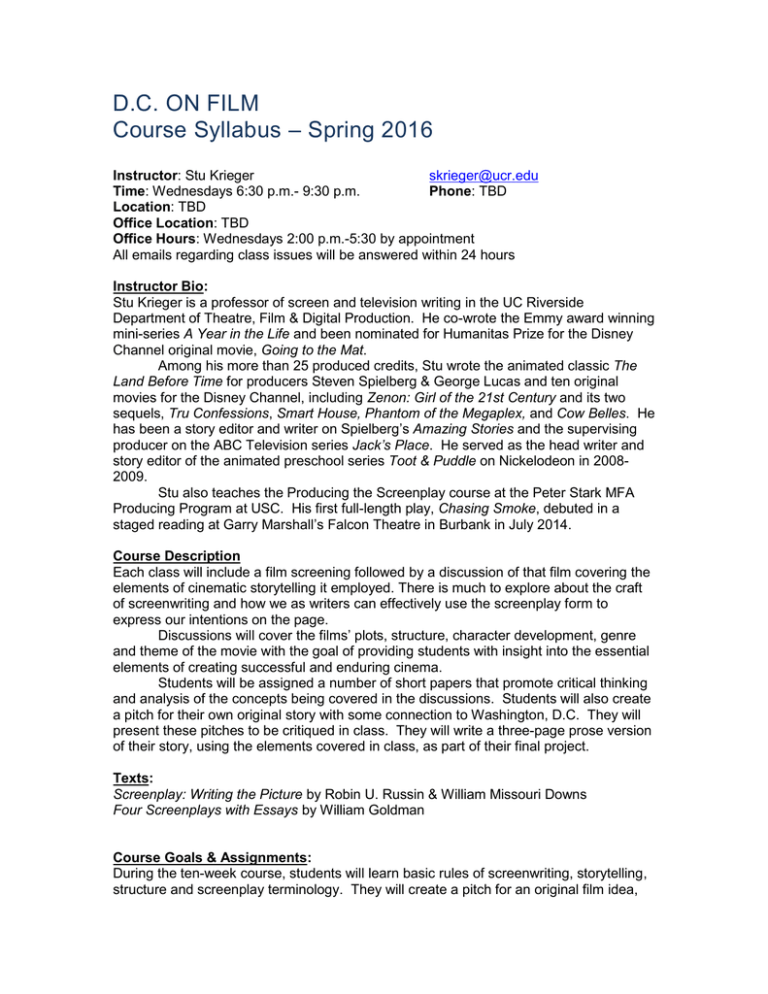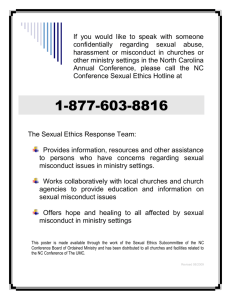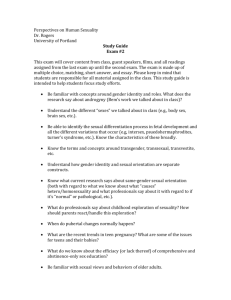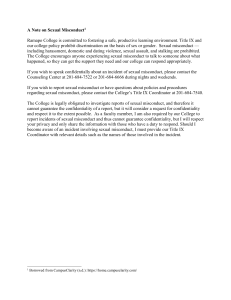D.C. ON FILM Course Syllabus – Spring 2016 Instructor: Stu Krieger
advertisement

D.C. ON FILM Course Syllabus – Spring 2016 Instructor: Stu Krieger skrieger@ucr.edu Time: Wednesdays 6:30 p.m.- 9:30 p.m. Phone: TBD Location: TBD Office Location: TBD Office Hours: Wednesdays 2:00 p.m.-5:30 by appointment All emails regarding class issues will be answered within 24 hours Instructor Bio: Stu Krieger is a professor of screen and television writing in the UC Riverside Department of Theatre, Film & Digital Production. He co-wrote the Emmy award winning mini-series A Year in the Life and been nominated for Humanitas Prize for the Disney Channel original movie, Going to the Mat. Among his more than 25 produced credits, Stu wrote the animated classic The Land Before Time for producers Steven Spielberg & George Lucas and ten original movies for the Disney Channel, including Zenon: Girl of the 21st Century and its two sequels, Tru Confessions, Smart House, Phantom of the Megaplex, and Cow Belles. He has been a story editor and writer on Spielberg’s Amazing Stories and the supervising producer on the ABC Television series Jack’s Place. He served as the head writer and story editor of the animated preschool series Toot & Puddle on Nickelodeon in 20082009. Stu also teaches the Producing the Screenplay course at the Peter Stark MFA Producing Program at USC. His first full-length play, Chasing Smoke, debuted in a staged reading at Garry Marshall’s Falcon Theatre in Burbank in July 2014. Course Description Each class will include a film screening followed by a discussion of that film covering the elements of cinematic storytelling it employed. There is much to explore about the craft of screenwriting and how we as writers can effectively use the screenplay form to express our intentions on the page. Discussions will cover the films’ plots, structure, character development, genre and theme of the movie with the goal of providing students with insight into the essential elements of creating successful and enduring cinema. Students will be assigned a number of short papers that promote critical thinking and analysis of the concepts being covered in the discussions. Students will also create a pitch for their own original story with some connection to Washington, D.C. They will present these pitches to be critiqued in class. They will write a three-page prose version of their story, using the elements covered in class, as part of their final project. Texts: Screenplay: Writing the Picture by Robin U. Russin & William Missouri Downs Four Screenplays with Essays by William Goldman Course Goals & Assignments: During the ten-week course, students will learn basic rules of screenwriting, storytelling, structure and screenplay terminology. They will create a pitch for an original film idea, along with a more fleshed out version of their story and essays that illuminate the characters, themes and sociological issues examined in the films we screen in class. Various guests that have a career connection to the screenings will appear throughout the quarter, subject to availability. Grading 30% on attendance and participation in class discussions 30% on the timely submission of all assignments 40% on the final project: the pitch, story and character essays for the original film idea the students create. “Quality” in creative work is extremely subjective; therefore, the final grade will not be based on the professor’s affinity for the project but on whether or not the material reflects a firm grasp on the storytelling concepts covered during the ten-week quarter. Late and missed weekly assignments and repeated absences from class will result in a marked reduction of the student’s overall grade. Course Materials and Accessibility The Professor reserves the right to make changes to the course schedule and screening choices based on the availability of selected guests throughout the term. The syllabus, descriptions of the course assignments and other announcements about the course will be posted on Blackboard. Plagarism Plagiarism is defined as passing off the words or ideas of someone else as your own. It is a serious infraction that could result in expulsion from UCR. You are encouraged to do research for your paper, including Internet research, but all sources used in your paper must be properly documented. An Internet search will be done on every paper to detect any plagiarism. Students are further encouraged to familiarize themselves with the University’s Policies and Regulations, available in the Course Catalogue. Policy on Weather Emergencies: In the event of a weather emergency, UCDC follows the federal government’s decisions about delays and closures. Policy on Academic Misconduct: UCDC has a zero-tolerance policy for cheating, plagiarism, and any other form of dishonesty. Students should refer to their home campus Student Code of Conduct for the regulations that apply to them. The burden is on each student to know what behaviors constitute cheating and plagiarism. Ignorance of these behaviors is not an adequate defense. Policy on Classroom Conduct: Students must treat each other with dignity and respect. All conversations regarding course material must be constructive and not personal, with comments reserved for the material not a critique of others’ opinions. Cell phones must be set to silent and in the case of an emergency call, students must leave the classroom in order to take that call. Laptops and other electronic devices must be used only for accessing notes and materials for this class. Any infractions of the above policy will result in one warning; further infractions will result in a reduction of that student’s grade. Statement on Sexual Harassment and Sexual Violence http://policy.ucop.edu/doc/4000385/SHSV The University of California is committed to creating and maintaining a community where all individuals who participate in University programs and activities can work and learn together in an atmosphere free of harassment, exploitation, or intimidation. Every member of the community should be aware that the University prohibits sexual harassment and sexual violence, and that such behavior violates both law and University policy. The University will respond promptly and effectively to reports of sexual harassment and sexual violence and will take appropriate action to prevent, to correct, and when necessary, to discipline behavior that violates this policy on Sexual Harrassment and Sexual Violence. Students who wish to speak confidentially about an incident of sexual misconduct should contact UCDC’s Counseling Services at UCDCCounseling@gmail.com. To report sexual misconduct or to ask questions about UCDC policies and procedures regarding sexual misconduct, please contact the UCDC Title IX administrator, Josh Brimmeier (202-974-6214 or josh.brimmeier@ucdc.edu.) Because the University of California is legally obligated to investigate reports of sexual misconduct, the confidentiality of reported misconduct cannot be guaranteed. Statement on Accommodations for Students with Disabilities In compliance with the Federal Rehabilitation Act of 1973, as amended (Public Law 93112) and the Americans with Disabilities Act of 1990 (Public Law 101-336), University of California policy prohibits unlawful discrimination on the basis of disability in its programs, services and activities. If you require accommodation for class, please let me know at our first meeting (if not before) so the necessary arrangements can be made. ## Weekly Plan: Week 1: We will screen and discuss “Mr. Smith Goes to Washington.” Following the screening, students will be asked to write the plot of “Mr. Smith” in three sentences. The emphasis of the session will be on storytelling. We will play improvisational writing games designed to help students understand the elements of a good story. Week 2: We will screen and discuss “Dr. Strangelove,” focusing on character and story arc. During the workshop portion, we will play the Story Elements game and then students will present a very rough short verbal pitch for the screenplay concept they will be developing during this quarter. Week 3: We will screen and discuss “First Monday in October.” A former Supreme Court clerk will be our guest. We will discuss the seven basic plots that all stories fall into and students will be assigned a paper to analyze the first three films we watched, writing about which story type they believe each of these films to be and why they have made this choice. Week 4: We will screen and discuss “Wag the Dog.” In the post-screening discussion, we will cover the concepts of loglines and taglines and students will be assigned the task of creating a tagline and a logline for their own original ideas that they will bring to class the following week. Week 5: We will screen and discuss “The American President.” We will cover character development. For the next class, students will fill out two Proust Questionnaires in the first-person voices of two characters from the five films we have watched so far. Week 6: We will screen and watch “Primary Colors.” We’ll discuss the responsibility filmmakers have in bringing fictionalized versions of real people to the screen. A Washington based journalist will be our guest. Week 7: We will screen and discuss “Lincoln.” Students will be assigned to write a pitch for a story on another U.S. President, defending their choice with facts on why this person would make a dynamic subject for a biopic, citing elements of dramatic storytelling covered in class. Week 8: We will screen and discuss “Charlie Wilson’s War.” Half of the students will deliver their pitches for their original pieces. Week 9: We will screen and discuss “Thirteen Days.” The remaining students will deliver their pitches. Week 10: Students will submit a hardcopy of their final projects. In class, we will watch and discuss “All the President’s Men.” Our final guest will be a Washington Post political reporter. ##




